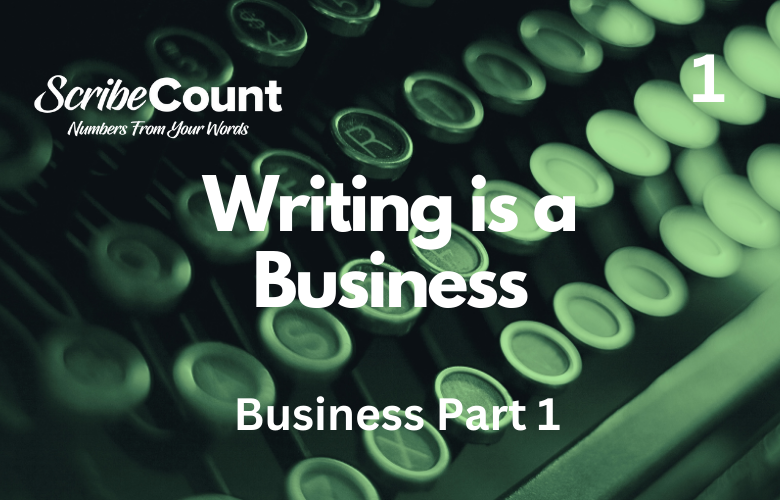Writing is a Business.
If you’ve read a few articles about Self-Publishing, you will have seen a certain line repeatedly.
“Treat your writing as a business.”
- Every Successful Author
There’s a good reason for this. Yet the task of doing so is usually met with resistance.
Few creative people find the business side of their work enjoyable. This is understandable. What creative writer out there would rather read about tax codes or calculate insurance rates when they could instead be building exciting worlds and sending their characters out into them on grand adventures?
It's business.
It’s dry. It’s boring. It’s something to be suffered through so you can get back to the fun stuff.
This is true. But it’s also necessary if you wish to be successful, be safe, and most of all, be wealthy.
Even if a writer accepts the fact that they need to do so, they will often view setting up their business as something to get over with quickly so they can get back to writing. Their creative minds rebel at the sight of long blocks of business text, government red tape, and seemingly endless forms to be filled out. That’s reasonable, they’d rather be writing. But setting up a publishing company is not something you want to approach casually. It needs to be done and done right the first time to reap any benefits.
But first, let's answer a couple of “Why’s”.
Why do you need to treat your writing as a business?
As a writer, a large majority of the tasks you will be performing every day are business-oriented. Writing is actually a small part.
While hours spent at the keyboard are still a requirement, other skills have become equally important. Authors today are not just writers; they are also media companies.
“Businesses that rely solely on a website and traditional advertising to hold their audience’s attention will soon fall behind. Today’s media landscape demands a cross-platform approach with multiple touchpoints for connecting with consumers. Brands today compete in a flattened media landscape. When people consume content online, in print, on podcasts or through videos, they’re more likely to care about the quality of the content than who created it or even where it appears.”
- Nathen Pettijohn of Forbes
You're no longer just a writer
Today’s author wears many hats. Marketer. Editor. Formatter. Graphic Artist. Social Media Expert. Accountant. Manager. Entrepreneur. And of course: Businessman. These are just some of the requirements to be an author in the new world of publishing.
The list of needed skills is long and ever-growing. Even with a traditional publishing deal, chances are high that any contract the author signed today hinged greatly on the strength of their existing media presence.
Today, for the author to reach the reader the necessary infrastructure is already in place and readily available to everyone. No gatekeeper or out-of-reach financial hurdle is standing between the author and the printing press, the satellite, or the bookshelf. There’s no need for a massive sales team, a six-figure ad budget, or an expensive middleman to get your books off your desk and into the hands of the reader. The Internet and the tools it provides are now all that are required. The ability to use those tools to get your book in front of the reader is now equally as important as the ability to write it. The author who recognizes this and takes the steps to both learn and leverage these tools will be in the best position for success.
But they must first understand that they are running a business. Learning the business side thoroughly will answer questions like:
- - How do I protect my books from being pirated, plagiarized, or stolen?
- - How do I leave my work to my loved ones after I die?
- - How do I file taxes as a business and what’s the best structure for doing so?
- - How do I copyright my work and why is it so important?
- - What’s the difference between Royalties and Proceeds from Sales?
- - What are the advantages of having my own business and how do I benefit from them?
- - How do I protect myself and my business from being sued?
Running a self-publishing business means having the right foundation in place, knowing the logistics, laws, and business structures you will be operating in, how they pertain to the movement of your work from you to the reader, and most importantly, how to keep the money you earn. This all comes before mastering the craft of writing.
Simply put, a good foundation in business will help ensure success.
So why not put it in place at the start?
Why should I do this now?
Future success is impossible to measure.
For most successful authors success came as a surprise, one they were unprepared for. Having the proper framework in place to handle such success is not hard to set up beforehand and is certainly better than having to scramble to catch up. Some easy choices, and a little extra expenditure when starting out, can make that future success much easier to handle.
For the sake of this section, we will be planning for success rather than failure.
By “Success” we mean an income of $50,000+ a year. We will be putting our efforts into building a business that is ready and able to both capitalize on and protect itself when that success arrives, all without slowing that success down or denying you any opportunity that may present itself along the way.
You may not make it to $50,000 this year, or even next year, or the year after. But until you do you’ll be able to leverage what you do make into more passive income, pay less in taxes, and be that much closer to that $50,000 with every passing year, all without creating more content.
When success arrives, it's best not to be standing in your own way.
What is this section about?
The articles in this section are designed for the new author or the one who has decided to grow their writing hobby into a viable business. It does not have information on the latest marketing trends or the inner workings of any of the publishing platforms. It does not dive into Amazon's algorithms or the many intricacies of FaceBook ads. Nor does it speak to the craft of writing, editing, or publishing your work. We cover those items in other sections.
This section is about the business side of being an independent author. It will provide detailed explanations and step-by-step instructions on how to properly set up an independent author’s publishing business. The goal of this section is to help the author build the foundation necessary for them to leverage their books into a viable and long-lasting business, and to do so with as little pain as possible.
In this section you will find instructions on:
- - Forming, Registering, and Operating a Limited Liability Company.
- - Setting up bank accounts and lines of credit.
- - Selecting the tax structure that leaves the most money in your business.
- - How to protect your business and ensure its survival long after you are gone.
This section is 80% explanation and 20% execution. While it will talk you through the “how” of setting up a business, it’s important to understand the “why” of every step before you do so. Do not be daunted by the number of articles or the list of tasks contained within them. The total amount of work involved is actually quite small and we’ve broken it up into bite-sized pieces. We might spend a page or two explaining a simple yes or no question, but the answer to that question may be worth a lot of money. It’s in your best interest not to skip ahead.
If there is a step in the process, a form that needs to be filled out, a bank or government agency that demands your participation, red tape that needs to be cut, or legalese that needs to be explained, we will talk you through it. Usually with screenshots and step-by-step instructions.
Throughout this section, you will also find ACTION ITEMS, NOTES, TIPS, and PRIVACY WARNINGS. Please be sure not to skip over them.
Building on solid ground
Some of this business-building is complicated. You will be asked to make decisions that are important ones, and we have attempted to explain them as simply and as clearly as we can. That said, the process itself is not hard. As we mentioned, the majority of it is filling out forms correctly, understanding and selecting the best options for you and your business, and getting those forms and information to the right places in order to make your business a viable one.
Be not afraid. The skill level needed to accomplish this is not high, and the time is well spent. The knowledge gained in the process will benefit you for years to come.
The business side is important, so let’s get it done and done right, so you can get back to work doing what you love to do. By the time you are through with this section, and have completed the steps described herein, you will be able to get back to writing, comfortable in the knowledge that you have done everything you can to secure your work, minimize your tax debt, and maximize your income, for years to come.

